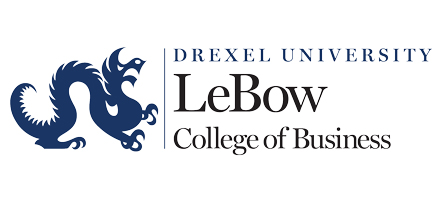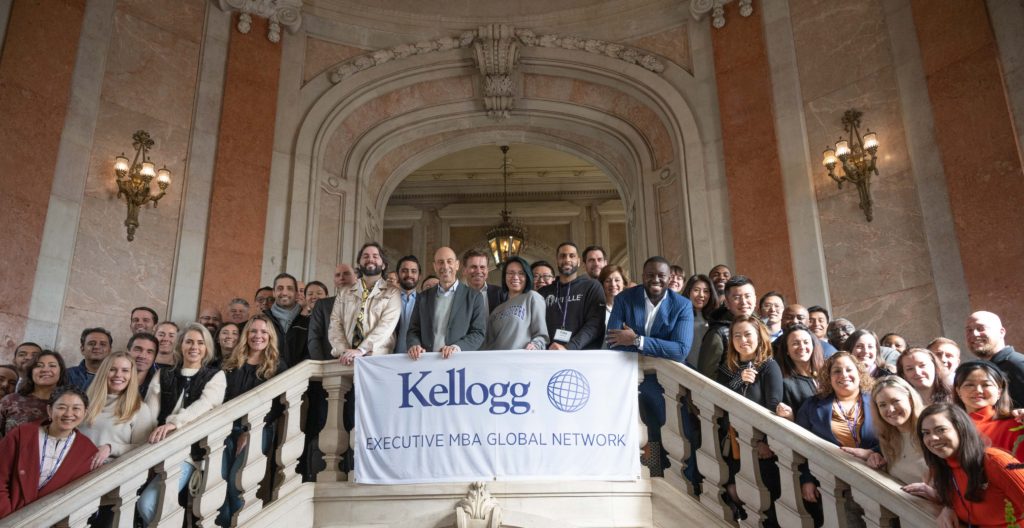
Students from Kellogg’s popular EMBA elective, Strategic Brand Management + International Finance, pose in the 19th Century Portuguese palace where students complete their live case exercise. Photo credit: Maria Rebelo
Rob Feng of Los Angeles developed his business chops in the field over two decades in the film and creative industries. He learned the nuts and bolts and of brand messaging directing commercials and working in advertising, but he had no theoretical grounding. Though he worked on complex, international financing deals as a CEO and executive producer at Dream Factory Group, he had no formal training.
He’s worked around the world, and won an Emmy for Outstanding Main Title Design for his work on HBO’s culture-defining Game of Thrones. Feng decided to pursue an executive MBA after seeing too many brilliant projects struggle because of a lack of business acumen. He wanted to apply the varied hodge podge of business skills he’d learned on the job and better understand the relationship between them.
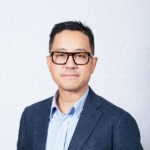
Rob Feng, EMBA
So, one particular elective caught his eye immediately at Northwestern University’s Kellogg School of Management: Strategic Brand Management + International Finance. This unique course combines the two competing disciplines into one course, culminating in a week-long trip to Lisbon, Portugal, for a live case exercise with a real company.
“These courses have provided me with the strategic ‘why’ behind my decisions,” says Feng, EMBA ‘24, chief creative officer of Hexagram, a creative tech studio for the entertainment industry.
“They have given me the deeper insights and confidence to navigate the international business landscape more effectively and have more in-depth conversations with finance and marketing experts.”
MIXING VINEGAR AND OLIVE OIL
What happens when you whisk together vinegar and olive oil? Their molecules repel, each trying to keep to their own kind. It’s a little like finance and marketing people in a company, says Sergio Rebelo, Kellogg’s MUFG Bank Distinguished Professor of International Finance.
“They usually don’t talk to each other and usually have completely different points of view. Marketing people like to talk about creating value; Finance is very much focused on profits. Marketing people are very focused on market share, and finance people sometimes say well you can win market share and lose a lot of money,” Rebelo tells P&Q.
“We think win-win situations come when you bring the two perspectives together. We need to create a common language so that people can make decisions that are both good for the bottom line and good for the positioning of the company.”
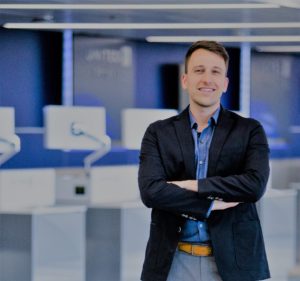
Alexander Dorow
That’s what Kellogg is trying to do in this elective, one of the school’s most popular electives in its highly-ranked EMBA program. Strategic Brand Management, taught by Kellogg marketing professor Alexander Chernev, and Rebelo’s International Finance elective are also offered as separate electives. But, by combining them into another elective option, the hope is to get different members of the team talking and to at least understand the opposing points of view.
“Beyond the course description was the thoughtful connection between otherwise seemingly competing topics. How do I develop my brand outside of my home market while doing so in a financially responsible way?” says Kellogg EMBA candidate Alexander Dorow.
As managing director of clubs and lounges for United Airlines, Dorow is responsible for all commercial aspects of the airline’s clubs around the world. That includes strategy, pricing, design, partnerships, and more. He considers himself a strong marketer, but hadn’t ever learned the science behind the decisions. At the same time, he saw the course as a chance to hone his financial skills in an increasingly global context.
“This course appealed to me for the international application. So many factors go into how to operate outside of a business’ home market, and this class provoked critical thought and real-life applicability.”
LIVE CASE: TAKING A LUXURY PORCELAIN MAKER GLOBAL
For the combined elective, Chernev, and Rebelo have worked to connect brand strategy and international finance as much as possible. They’ve recorded videos of some of the nuts and bolts material that students can watch at their convenience, freeing up classroom time for robust discussions and exercises. Throughout the semester, students use their classroom lessons to prepare for the real work ahead – a weeklong live case exercise at the end of the course.
The kicker: The exercise takes place in a late 19th century palace in Lisbon, Portugal.
“It’s one thing to study and learn about concepts and theories in the safety and comfort of a classroom, especially as you are trying to balance school with full-time work,” says Emily Hawrysz, EMBA ‘24, Senior Director of Strategic Transformation at the National Insurance Crime Bureau.
“But it’s another level to apply them in real-time and get even further outside of your comfort zone in a foreign country.”
The live case is the core of the elective. Each year, it centers around a regional Portuguese business with an interesting problem. EMBA teams spend a week working out solutions, applying all the frameworks and lessons they learned in the semester. In the past, companies have included Portuguese winemakers and luxury shoe brands.
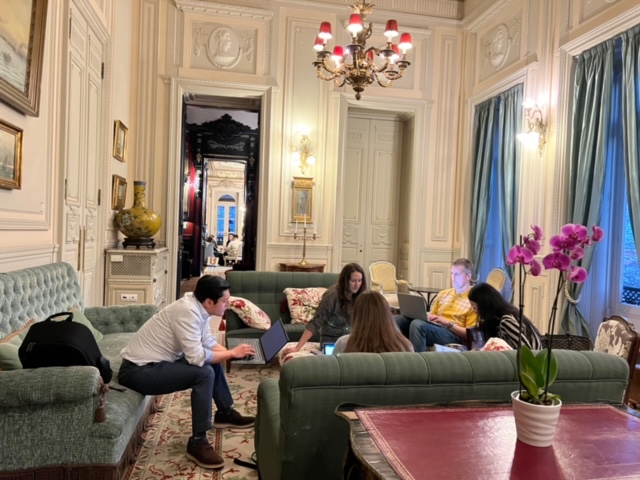
A team of Executive MBAs work on their live case project for Vista Alegre in December at the palace in Lisbon. Photo credit: Maria Rebelo
This year, students worked with Vista Alegre, a Portuguese porcelain maker since 1824. It now wants to grow into a global luxury brand while staying true to its community-centered values. Its chief marketing officer spent the afternoon with the Kellogg EMBAs in the palace, filling the class space with examples of their products that students could see and touch. It discussed its different marketing strategies in different regions of the world, like in South Korea where it invited artists to come to its factories and use its porcelain to design art pieces for a special exhibition. An usual, but effective marketing strategy, Rebelo tells P&Q.
“It’s a completely different experience than the traditional case where you read something that’s been written and the decisions have already been made,” Rebelo says.
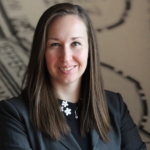
Emily Hawrysz, EMBA ‘24
“I think it’s important to show other realities. There are many different markets, many different strategies. When people open their minds to other ways of doing things, it tends to spark creativity. And I think that’s what we are trying to do at Kellogg: To create new ways of thinking.”
At the end of the week, students presented their case findings and recommendations to Vista Alegre executives. And that’s where the most valuable feedback from the course is delivered: From the company executives themselves.
“Not every student has a chance to immediately apply what they are learning in the classroom to their day-to-day role. Having a live case study portion reinforces the concepts and provides an opportunity to practice identifying which pieces of the material best align to the business objectives you’re trying to meet and getting real-time feedback on your choices,” says Hawrysz.
“It’s one thing to learn about concepts in a classroom, but another to be able to know when and how to put those concepts to use successfully.”
Hawrysz served 12 years in the FBI holding various positions in information technology management, transnational organized crime programs, and finally within the Washington Field Office. She pivoted to the National Insurance Crime Bureau in 2020 and wanted to pursue an MBA in order to transition into leadership roles with increasing impact. The Kellogg mantra of “high impact, low ego,” appealed to her, and the EMBA format allowed her to stay in the workforce and grow professionally while being able to apply her lessons to her work.
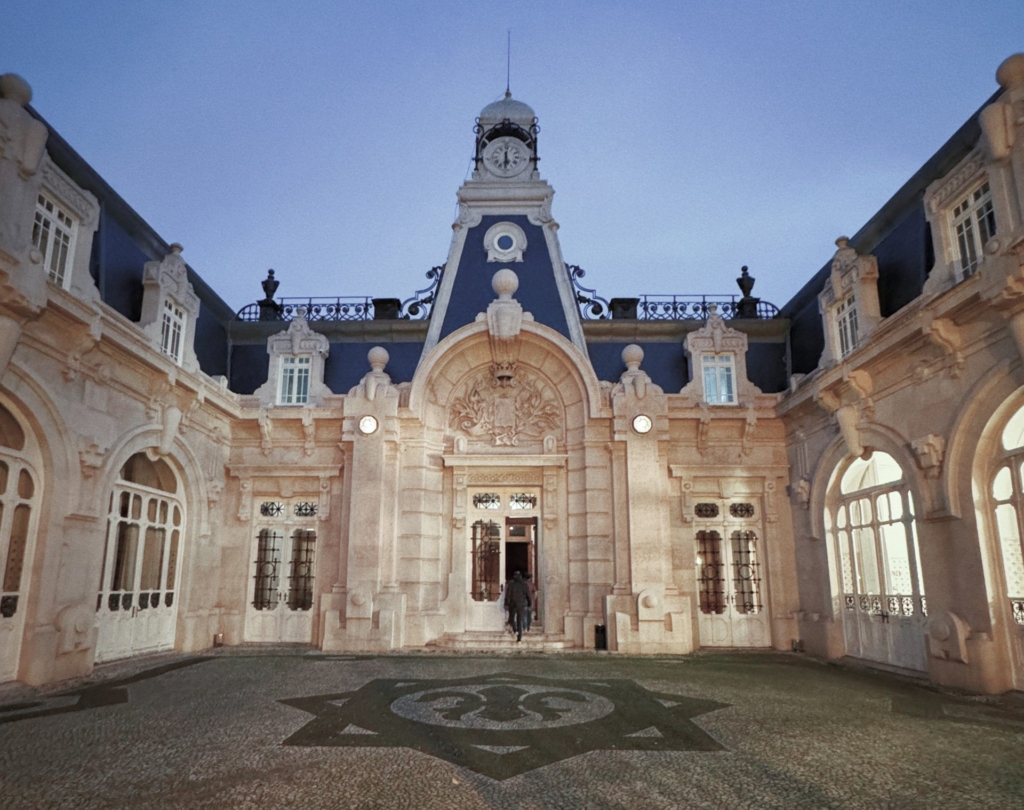
Kellogg’s students stay at Pestana Palace in Lisbon throughout the week to work on their live case exercise. Courtesy photo.
LEARNING IN A 19th-CENTURY PALACE
Global has long been a key distinction of Kellogg’s EMBA. Its MBA alumni network boasts 60,000 members in more than 100 countries. In 2022, its EMBA was awarded STEM designation, helping it attract top international students from around the world. It offers a host of electives taking students around the globe from Ecuador to Australia.
Kellogg also likes to experiment, like any manager worth her salt. Take a problem, try a solution, see what works and what doesn’t.

Alexander Chernev
One challenge Chernev, and Rebelo wanted to overcome in this elective is the diminishing impact of business school lessons overtime, especially for executives MBAs whose attention is pulled in multiple directions between school, work, and family. In typical courses, executives come to class for an intense weekend, stuff their brains with theories and models, and then return to whatever they’ve got going in their everyday lives.
But what if there were a way to eliminate distractions, if only for a limited amount of time? Like, say, sequestering students in a 19th century Portuguese palace?
“When you stay in an exceptional place, with exceptional food, and exceptional everything, you are in a heightened state of alert. You see something special is happening and you’re much more receptive than going to another classroom where you’ve been before,” says Rebelo.

Sergio Rebelo
Unlike some other international courses where students pack multiple company visits and field trips to get the most out of their time in country, students in the combined elective stay mainly at the palace. They make time for cultural and sightseeing excursions, but they spend the bulk of the week together working on the live case. The final dinner is in the hall where the Portuguese government historically met and made decisions on behalf of its people.
“It’s a symbolic place. You know, the decisions we make have a lot of importance for the lives of a lot of people. So, it’s to communicate this idea that what you do as leaders really matters for society,” Rebolo says.
Feng agrees.
“The value of these experiential courses in my EMBA journey lies in their ability to take learning beyond the traditional classroom setting. Being in a different location and outside of my normal routine provided a fresh perspective, enhancing my ability to absorb and understand new concepts,” he tells P&Q.
“Looking back, the insights gained from this trip – especially regarding innovation and strategic thinking within different cultural contexts – will undoubtedly influence my approach in my current role and as I navigate future career opportunities. The Lisbon experience was not only academically enriching but also pivotal in broadening my professional and personal perspectives.”

